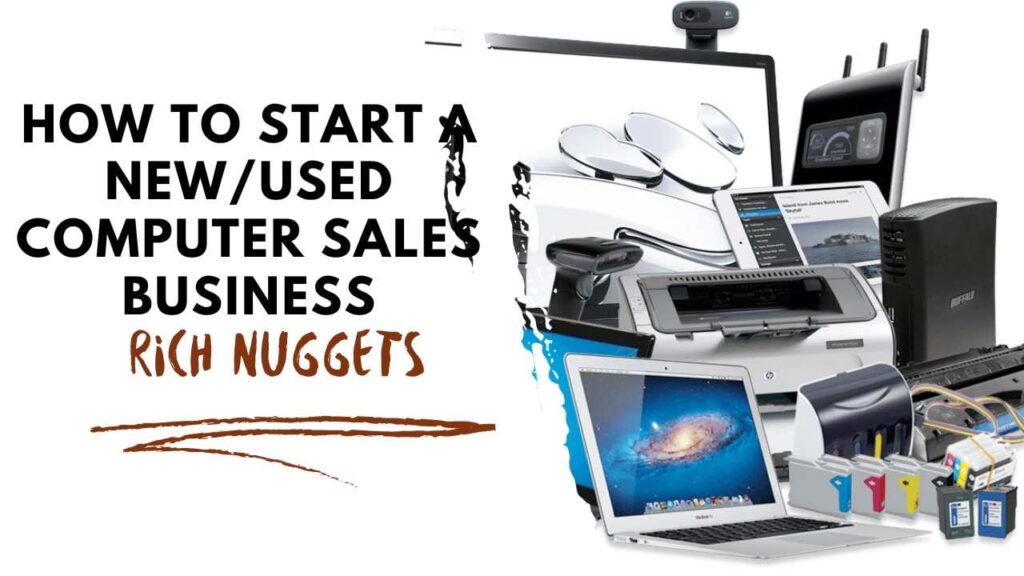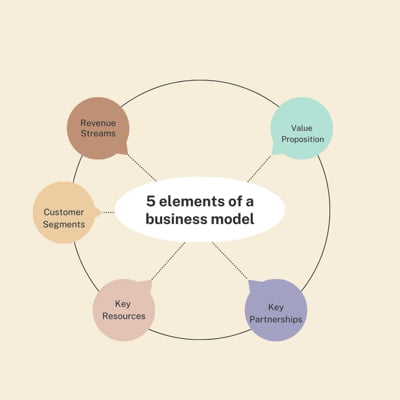
A computer sales business is a business establishment that specializes in the selling of computers (laptops, desktops), computer hardware, software, and related accessories to consumers or businesses for personal use, business use, or both.
This business can be operated in various formats, including physical retail stores, online e-commerce platforms, or a combination of both.
In this article on “How to Start a New/Used Computer Sales Business”, we will unveil the practical steps to starting your own business of selling computers (inclusive of Personal Computer (PC) and desktops).
Table of Contents
1. Determine your Product Range:
Determining your product range is the first critical step to be taken when starting a computer sales business.
It involves deciding what types of computer-related products you intend to offer to your customers.
Because of how powerful the impact of this decision will shape your business it should be based on market research, including customer preferences and competition in the Nigerian market.
Additionally, you should consider your budget, sourcing capabilities, and your ability to provide customer support and service for the products you choose to sell.
There are various categories of computer-related products that you can sell within the computer business, they are:
- New Desktop Computers
- New Laptops
- Used Computers
- Tablets
- Computer Peripherals
- Software
- Related Accessories such as cables, adapters, laptop bags, and other complementary products.
Focusing on a specific niche will set you apart from your competitors. For example, you could specialize in gaming laptops and accessories, catering to gamers’ needs. This can help you establish a strong reputation in that particular market segment.
But if you choose to offer a wide variety of products, you will attract a broader customer base. However, this approach is more challenging in terms of being capital-intensive, managing of inventory, and marketing your products effectively to diverse customer segments
2. Your Mode of Operation:
Decide whether you want to establish a physical retail store, operate exclusively online through an e-commerce platform, or combine both approaches.
Each method has its advantages and considerations, but most importantly choose the one that suits your budget and target market.
3. Location, Shop, Setup:
If you choose to have a physical retail presence, this step is mandatory for you.
It involves selecting the right location for your store, setting up the shop, and organizing it in a way that attracts customers and protects your inventory.
In terms of spotting the perfect location for your computer sales business, the location must have an embodiment of these elements:
- Commercial Area
- Proximity to Competitors
- Accessibility
If those three elements are in place, then you automatically have a location that has high footfall and good visibility which is needed to succeed in this business.
Your shop and setup is basically to enhance customers’ experience and it should encompass:
- Interior Layout
- Visual Appeal
- Inventory Display
- Checkout Area
- Security Measures such as security personnel, surveillance cameras, alarms, and anti-theft devices
4. Regulations and Compliance:
Starting the business of selling computers comes with meeting some legal obligations and among these legal obligations, two seem to be compulsory no matter the scale of operation you decide to run your business with. They are:
- Business Registration
- Tax Obligations
You must register your business with the authorized body which is the Corporate Affairs Commission and obtain your Tax Identification Number (TIN) from either the State Internal Revenue Service or the Federal Internal Revenue Service.
Other regulations and compliance that are relevant to this business are;
- Import Regulations (if you are involved in sourcing inventory outside of Nigeria)
- Industry-Specific Regulations (if you are involved in the manufacturing process)
- Data Protection and Privacy Laws:(if you are going to provide technical services)
Failure to adhere to these regulatory and compliance requirements can result in legal penalties, business disruptions, and damage to your reputation.
5. Source Inventory:
Without inventory, there is nothing to sell, and if your inventories are not up to customers’ expectations, it means your business won’t survive in the long run. That is how critical this step is.
Your suppliers should have a reputation for quality computers or whatever computer niche you want to invest in. These suppliers could include:
1. Distributors and Wholesalers: These categories of suppliers can easily be accessible in Nigeria. Here are some of the major distributors and wholesalers of computers in Nigeria:
- Ample Computer Limited
- Mitsumi Nigeria Limited
- Tritech Computers Limited
- YouCloud
- Microchips Systems Limited
- TICON Technologies Limited
- Gofalinks Business Ventures
- Henrich Computers
Though most of them are mainly operating in Lagos, some of them do have outlets in almost every state in Nigeria. So you can easily contact and reach out to them to source your inventory which could be new, used, or refurbished.
2. Manufacturers: To obtain your inventory of computers and computer-related products directly from manufacturers, you’ll need to establish direct contact with these companies.
This involves negotiating a supplier agreement with them before any inventory supply arrangement can be finalized.
Unfortunately, there are no computer manufacturing companies in Nigeria, which means you’ll need to either reach out to them online or visit their facilities in person to express your intentions.
Another approach is to find the local representative offices of these manufacturing companies in Nigeria, making it easier to establish a connection with them.
Additionally, ensure that the inventory you source meets quality standards.
For new products, insist on genuine and original items. Check for certifications and warranties that can provide assurance to your customers.
For used or refurbished products, assess the quality of the refurbishing process and the condition of the items.
It should be noted that consistently high-quality inventory is crucial for building trust with customers.
6. Service Provider (Optional):
If you possess expertise in any value-added service areas like computer repair, technical support, or custom PC assembly, it’s advisable to incorporate them into your business.
Doing so will not only distinguish you from your competitors but also create additional sources of revenue. However, it’s crucial to ensure your proficiency in these services.
On the other hand, if you lack the necessary skills, you can explore the option of hiring technically proficient staff who can deliver these value-added services effectively.
7. Hire Staff:
Depending on the size of your business and the scale at which you decide to run your computer sales business, if you ever decide to hire a staff let it be a staff with expertise in computer technology, sales, and customer service.
Ensure they are knowledgeable about the products you sell and can provide assistance to customers.
And yes, is it possible to hire a staff that knows little to nothing about computers, provided you have other experienced team members capable of training them until they acquire the necessary expertise to directly assist customers?
8. Establish Positive Customer Relationships:
The key to success for your computer sales business in this fiercely competitive industry is ensuring that your customers leave satisfied every time they choose to do business with you. –Happy customers are more likely to make repeat purchases.
To build and maintain a positive customer relationship, you and your team should consistently incorporate these key elements when interacting with customers, and your business should be recognized for them.
These attributes include:
- Excellent customer service
- Offering product warranties
- Prompt handling of complaints and inquiries
- Transparency and Honesty
- Personalize the customer experience as much as possible
- Follow-up and feedback
- Engage with your local community by participating in or supporting events, schools, or organizations that focus on the community.
- Customer Loyalty Programs
By prioritizing customer satisfaction and consistently delivering on your promises, you can build a loyal customer base that will sustain your business, especially in economic hard times, like what we are currently facing in Nigeria.
9. Marketing and Promotion:
To effectively reach and engage your target audience, you need a well-planned marketing strategy that leverages various online and offline channels.
In other to develop this perfect marketing strategy you have to start by outlining your goals, target audience, key messages, and the channels you’ll use to reach your customers.
Consider both short-term and long-term objectives.
Here are some marketing strategies to explore when starting the business of selling computers as a wholesaler, retailer, or even as a manufacturer:
- Online Marketing Channels: Social Media, Email Marketing, and E-commerce Website
- Offline Marketing Channels: Traditional Advertising (like newspaper ads, radio commercials, and billboards), Local Events and Sponsorships
- Promotions and Discounts
- Content Marketing
- Targeted Advertising: such as Google Ads and Facebook Ads
- Customer Reviews and Testimonials
By combining these marketing strategies, you can effectively promote your computer sales business and increase its visibility in the Nigerian market.
What are the Common Pitfalls in Computer Sales Startups Business
Here are some common challenges in computer sales startups business:
- Failing to conduct thorough market research can result in a mismatch between your offerings and customer demands.
- Underestimating startup costs and ongoing expenses can lead to financial strain and even business failure.
- Overstocking or understocking can lead to financial losses and operational inefficiencies.
- Failing to distinguish your business from competitors can lead to price wars and reduced profitability.
- Neglecting marketing and promotion can result in limited visibility and slow growth.
- In the digital age, not having a strong online presence can hinder your reach and customer engagement.
- Inadequate customer service can lead to customer dissatisfaction and lost business.
- Not staying updated with technology trends and offering outdated products can result in a loss of customers to more innovative competitors.
- Failing to comply with business regulations can result in legal issues and penalties.
- Rapid expansion without adequate resources and preparation can lead to financial strain and operational challenges.
READ ALSO:
- How to Start a Business in Nigeria in 9 Easy Steps
- How to Start Mobile Phone Business in Nigeria as a Retailer or Wholesaler
- The 7 Key Steps to Profitability: How to Start an Electronics Business in Nigeria
Final Thought on Starting a New/Used Computer Sales Business in Nigeria
Starting a computer sales business in Nigeria requires careful planning, a solid understanding of the local market, and a commitment to meeting customer needs.
Stay up-to-date with industry trends and customer preferences to ensure the long-term success of your venture.
With dedication and a customer-centric approach, you can thrive in the competitive computer sales market in Nigeria.
FAQs
Is selling of Computers Profitable?
Yes, the business of selling computer is very profitable, regardless of the specific niche or grade (new or second-hand) you opt for.
However, factors like your location, the level of competition, and your business strategy, particularly in negotiation if you deal in second-hand computers, can significantly influence your overall profitability.
Nevertheless, selling computers and its related items is a profitable venture that should be a strong consideration if you are looking for a business to start.
How much do I need to Start a Computer Sales Business?
The startup capital for a small to medium-sized computer sales business may range from approximately 10,000,000 NGN to 50,000,000 NGN or more, depending on these factors such as specific products and services you intend to offer, the grade of your products, and the brand of computers you intend to invest in.
For example it will cost you more if you are going to be selling Macbooks over other computer products because of the quality and the price it comes with.
Discover more from StartBizEasy
Subscribe to get the latest posts to your email.





